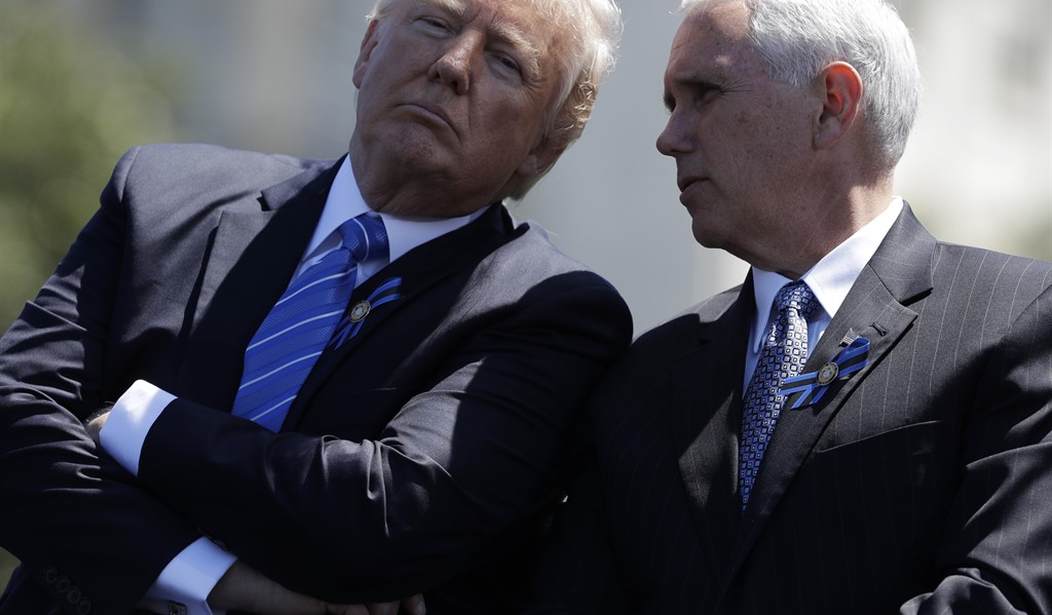Usually we blame the guy who shared sensitive information with the other side, not the media for reporting on it, when divvying up responsibility for putting Americans at risk. But then, attitudes about leaks are as reliably partisan as attitudes about the virtues of the filibuster when your party is/isn’t out of power. One thing, though: How can the WaPo story simultaneously be “fake news,” as many Trumpers insisted last night, yet also contain dangerous leaks that imperil national security? The spin seems to have shifted in the past 12 hours from “Trump didn’t disclose anything sensitive” to “Trump did disclose something sensitive but it was okay to do so in that context” — wholly appropriate, as McMaster said — although not okay for the public at large to know. Because if the wider public knows, so does ISIS. Alan Dershowitz makes the case:
Had President Donald Trump’s mistake remained a secret known only to our national security establishment (and of course the Russians ), the Islamic State group would probably never have learned of it. (Russia and the Islamic State are not exactly on speaking terms.) The Islamic State group learned about it only because current and former U.S. intelligence agents leaked it to the media, which published it. The Islamic State group may now use this information to track down and kill informers or double agents who may have provided the information to our ally. They may also speed up their plans to use laptops to blow up commercial airlines. None of this may have happened without the leak and publication.
News of a plot to bring down planes with laptop bombs has been out there for months, though. ISIS would have been clued in long ago to the fact that we knew what they were up to, long before WaPo’s story. And of what use was yesterday’s Post scoop to ISIS when it didn’t name the key location involved? That was the crucial detail that Trump supposedly gave to the Russians but which WaPo didn’t reveal. All ISIS would know from the article is that a U.S. partner has intelligence from somewhere in ISIS-held territory about the laptop plot — and that much was already inferrable when news of the plot first started leaking in March.
Besides, there may be a virtuous reason for natsec leaks in this administration. Erick Erickson:
What sets this story apart for me, at least, is that I know one of the sources. And the source is solidly supportive of President Trump, or at least has been and was during Campaign 2016. But the President will not take any internal criticism, no matter how politely it is given. He does not want advice, cannot be corrected, and is too insecure to see any constructive feedback as anything other than an attack.
So some of the sources are left with no other option but to go to the media, leak the story, and hope that the intense blowback gives the President a swift kick in the butt. Perhaps then he will recognize he screwed up. The President cares vastly more about what the press says than what his advisers say. That is a real problem and one his advisers are having to recognize and use, even if it causes messy stories to get outside the White House perimeter.
“I am told that what the President did is actually far worse than what is being reported,” Erickson claims. BuzzFeed’s sources told them the same thing yesterday while the WSJ reported that “the information shared was highly sensitive and difficult to acquire and was considered extraordinarily valuable.” One of Trump’s own senior people on ISIS told the Daily Beast, “With news like this I’m beginning to wonder why Trump ran in the first place and if he really cares about the country. I miss candidate Trump. Now he’s just a pathetic mess.” All of that sounds dire, even more so than WaPo’s story suggested. Maybe the Post did withhold some of the worst information about what happened during the Russia meeting from its story in the interest of not making the security problem more damaging.
Exit question: Is it true, as Trump claimed this morning, that he has the “absolute right” to share intelligence with Russia or anyone else? He has the power to do so insofar as he’s free legally to declassify any information he likes, but this wasn’t intel that had been gathered by the United States. It was gathered by an ally, reportedly Israel, and as WaPo noted yesterday, intel shared by other countries comes with strings attached. Quote: “Under the rules of espionage, governments — and even individual agencies — are given significant control over whether and how the information they gather is disseminated, even after it has been shared.” If Israel (or whoever collected the info) didn’t clear the White House to share it with Russia, Trump didn’t have an “absolute right.”








Join the conversation as a VIP Member